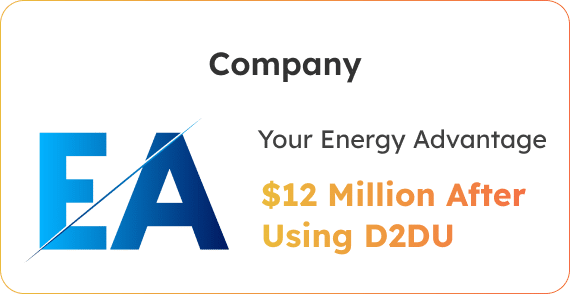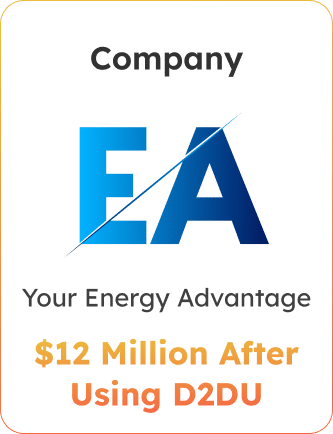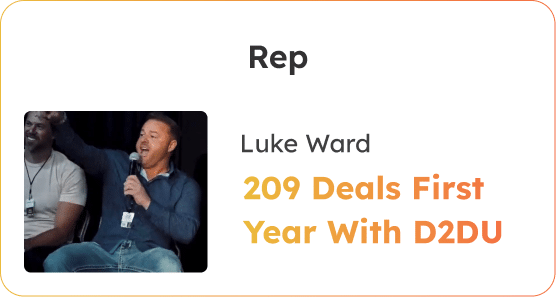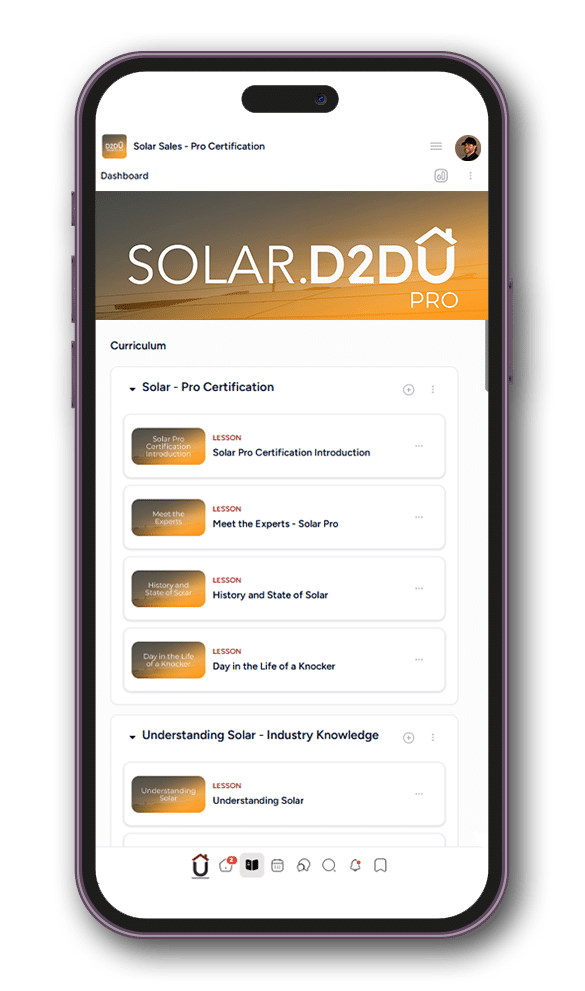Door to Door Solar Sales Training | Solar Sales Course

Get Certified. Join the Free Community.
Looking to skyrocket your solar sales career? D2D Experts’ dynamic solar sales training program is your ticket to higher sales numbers!
22,152+
Solar Students Trained
23+
Courses Offered
254+
Solar Sales Training Videos
144+
Companies Training
23+
Hours of Content
Meet Some Of Our Students




Best Solar Sales Training
Learn from the Experts in Solar: Sam Taggart, Michael O’donnell, Chris Adams, Pete Winston, Connor Free, and many others. These are reps and leaders that have sold over 250 accounts in one year! They go over the door to door solar sales pitch, presentation, closing, and more.

Here’s What You Get
Course 1: Solar – Pro Certification
Course 2: Understanding Solar – Industry Knowledge
Course 3: Types of Solar Sales
Course 4: Utility Companies
Course 5: PRO – Pitching
Course 6: PRO – Sales Skills
Course 7: Solar Sales Techniques – The Doors
Course 8: Area Management for Solar Pros
Course 9: Door Pitch Breakdown
Course 10: Pitch Variations
Course 11: PRO – Creating Quality Appointments
Course 12: PRO – Handling Objections
Course 13: PRO – Blowing By Smoke Screens
Course 14: Advanced Solar Door Objections
Course 15: Solar Sales Techniques
Course 16: The Pain Tunnel
Course 17: The Proposal – Walkthrough
Course 18: Presentation Deep Dive – Mitch Miesner
Course 19: Solar Ethics for Closers
Course 20: Advanced In-Home Objections
Course 21: PRO – Referrals
Course 22: Solar Pro – Complete Your Certification
Bonus: D2DU 101 Courses including Area Management, Mindset, Work Ethic, ABC of Closing, Referrals and more.

Are you a team or Company?
Get all your reps training and selling 10x more than what they are.
We Film your processes, tools, products, vision and add it to our content.
• Systematize your onboarding and training
• Save time by not having to always repeat yourself
• Track training hours, to know who’s serious and who isn’t
• Create training as part of your culture
• Get constant new content delivered for you to your people
• Avoid big liabilities due to bad sales practices and improper training
• Streamline the sales team, have them on the same page
• Scale to new markets with uniformity


Are you a team or Company?
Get all your reps training and selling 10x more than what they are.
We Film your processes, tools, products, vision and add it to our content.
• Systematize your onboarding and training
• Save time by not having to always repeat yourself
• Track training hours, to know who’s serious and who isn’t
• Create training as part of your culture
• Get constant new content delivered for you to your people
• Avoid big liabilities due to bad sales practices and improper training
• Streamline the sales team, have them on the same page
• Scale to new markets with uniformity
What is Solar.D2DU?
Solar.D2DU is an online platform that helps you sell solar energy systems more effectively.
You’ll learn to use local codes, rebates, and financial incentives to improve your solar sales techniques. Understanding what drives the industry, what customers want, and the technical details will help you guide your customers to the right solar system and build their confidence in your expertise.
Whether you’re involved in solar panel door to door sales or simply looking to nail your solar sales pitch, Solar.D2DU gives you the knowledge and tools that have successfully trained 22,152 students.
What is Solar.D2DU?
Solar.D2DU is an online education platform to help you be better at selling your customers on the value of solar.
You’ll be able to leverage local codes, rebate programs, and other financial incentives to exponentially grow your solar sales techniques.
By understanding the industry drivers, customer motivations, and technical specifications, you can better guide prospective customers to an appropriately sized system and instill confidence.
Testimonial Videos
Try Solar.D2DU Today!
FAQs
How do you explain the financial benefits of solar to a homeowner?
Switching to solar can reduce or eliminate monthly electricity bills, yielding average savings of $1,000+ per year, depending on system size and local rates. Homes with solar panels sell for a premium—studies show an average increase of $15,000 in resale value compared to similar non-solar homes. Plus, the 30% federal Investment Tax Credit (ITC) directly lowers your net system cost, putting cash back in your pocket in the first year.
What’s the best way to handle “I heard solar is a scam” objections?
Acknowledge the concern and clarify that solar is backed by decades of proven performance, rigorous industry standards, and millions of successful installations. Present third-party data from the U.S. Department of Energy and the FTC’s Consumer Protection resources to demonstrate performance guarantees and safety, supplemented with real customer testimonials and local case studies to build trust and credibility.
How do you know if a house qualifies for solar before knocking?
Use Google’s Project Sunroof to estimate roof orientation, shading, and solar irradiance potential in seconds—simply enter the address online. To ensure a strong ROI, verify economic viability by checking the homeowner’s electric usage and local utility rates (available via public utility websites or the PVWatts Calculator).
What kind of commissions can solar reps expect to earn?
Solar sales commissions typically range from 3% to 10% of the total system cost, meaning reps earn $600–$2,000 per sale on a $20,000 installation. Some companies structure a flat rate of $200–$400 per kW installed, so a 6 kW system might yield $1,200–$2,400 per installation. Top performers and multipliers for high-volume sales can push annual incomes into six figures.
How do you explain tax credits and incentives clearly?
Tell homeowners about the 30% federal ITC, which reduces their tax liability dollar-for-dollar for 30% of the system cost, with no cap. Then outline state, local, and utility rebates that often lower upfront costs by 10–20%, directing them to the DSIRE database for specifics.
What’s covered in the D2D Solar Sales Training?
Our Solar.D2DU program includes 23 industry-specific courses, featuring modules on “Understanding Solar,” “Effective Door Pitches,” “Hidden-Camera Live Scenarios,” “In-Home Presentation Frameworks,” “Objection Handling,” “Referral Generation,” and more—plus bonus access to D2DU 101 for core sales fundamentals. You’ll learn from top door-to-door leaders like Sam Taggart, Michael O’Donnell, Chris Adams, Pete Winston, and Connor Free.
How do you sell in markets with little sun or harsh winters?
Emphasize net metering and energy storage options that capture excess generation for winter use, ensuring value year-round. Share performance data showing that solar PV still produces 30–50% of peak summer output in cold climates, backed by DOE and NREL findings. Highlight battery rebates and off-peak savings to bolster the financial case.
How do you handle “I rent my home” objections?
Introduce community solar and Power Purchase Agreements (PPAs) that allow renters to benefit without owning panels. Explain that these models require no rooftop installation and tie to the tenant’s utility bill, making solar accessible regardless of home ownership.
What support is available after completing the training?
Graduates join our door to door community, receiving new videos every Tuesday and ongoing access to monthly Q&A calls, peer forums, and direct coaching. You’ll also have priority entry to live events and tournaments, as well as a dedicated Support portal for instant troubleshooting and updates.
How can I enroll in the Door-to-Door University – Solar training program?
Simply click “LEARN MORE” under Solar.D2DU on our Solar training page and fill out the registration form, or call us at (801) 876-6651 for personalized assistance. We’ll guide you through payment, scheduling, and immediate access to course materials.






















